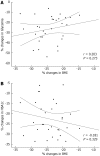Bariatric surgery and diabetes remission: sleeve gastrectomy or mini-gastric bypass?
- PMID: 24151386
- PMCID: PMC3801373
- DOI: 10.3748/wjg.v19.i39.6590
Bariatric surgery and diabetes remission: sleeve gastrectomy or mini-gastric bypass?
Abstract
Aim: To investigate the weight loss and glycemic control status [blood glucose, hemoglobin A1c (HbA1c) and hypoglycaemic treatment].
Methods: The primary risk factor for type 2 diabetes is obesity, and 90% of all patients with type 2 diabetes are overweight or obese. Although a remarkable effect of bariatric surgery is the profound and durable resolution of type 2 diabetes clinical manifestations, little is known about the difference among various weight loss surgical procedures on diabetes remission. Data from patients referred during a 3-year period (from January 2009 to December 2011) to the University of Naples "Federico II" diagnosed with obesity and diabetes were retrieved from a prospective database. The patients were split into two groups according to the surgical intervention performed [sleeve gastrectomy (SG) and mini-gastric bypass (MGB)]. Weight loss and glycemic control status (blood glucose, HbA1c and hypoglycaemic treatment) were evaluated.
Results: A total of 53 subjects who underwent sleeve gastrectomy or mini-gastric bypass for obesity and diabetes were screened for the inclusion in this study. Of these, 4 subjects were excluded because of surgical complications, 7 subjects were omitted because young surgeons conducted the operations and 11 subjects were removed because of the lack of follow-up. Thirty-one obese patients were recruited for this study. A total of 15 subjects underwent SG (48.4%), and 16 underwent MGB (51.6%). After adjusting for various clinical and demographic characteristics in a multivariate logistic regression analysis, high hemoglobin A1c was determined to be a negative predictor of diabetes remission at 12 mo (OR = 0.366, 95%CI: 0.152-0.884). Using the same regression model, MGB showed a clear trend toward higher diabetes remission rates relative to SG (OR = 3.780, 95%CI: 0.961-14.872).
Conclusion: Although our results are encouraging regarding the effectiveness of mini-gastric bypass on diabetes remission, further studies are needed to provide definitive conclusions in selecting the ideal procedure for diabetes remission.
Keywords: Bariatric surgery; Bypass; Obesity and diabetes; Sleeve.
Figures



References
-
- Poirier P, Giles TD, Bray GA, Hong Y, Stern JS, Pi-Sunyer FX, Eckel RH. Obesity and cardiovascular disease: pathophysiology, evaluation, and effect of weight loss. Arterioscler Thromb Vasc Biol. 2006;26:968–976. - PubMed
-
- Calle EE, Kaaks R. Overweight, obesity and cancer: epidemiological evidence and proposed mechanisms. Nat Rev Cancer. 2004;4:579–591. - PubMed
-
- Després JP, Lemieux I. Abdominal obesity and metabolic syndrome. Nature. 2006;444:881–887. - PubMed
-
- Musella M, Milone M, Bellini M, Fernandez ME, Fernandez LM, Leongito M, Milone F. The potential role of intragastric balloon in the treatment of obese-related infertility: personal experience. Obes Surg. 2011;21:426–430. - PubMed
Publication types
MeSH terms
Substances
LinkOut - more resources
Full Text Sources
Other Literature Sources
Medical

